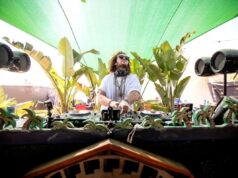In a time when social media often overshadows artistic expression, Avilynn aims to shine a spotlight on underrated artists—both hidden gems and well-known names. Based in Berlin, she crafts immersive sounds and delivers techno DJ sets that offer a unique experience. Her music is deeply personal, shaped by both experience and experimentation.
Her journey began in Athens, where she unexpectedly found herself organizing and playing at events to showcase some of the lesser-known genres of music. From there, her passion led her to DJing and ultimately to producing, earning early recognition from industry legends like Todd Terry under her previous alias. Since then, she has released various tracks and records and is also running her Not On Label Series, a collaborative concept with fellow artists.
Following her standout debut sets at Tresor and Astron, we had the chance to sit down with her to talk about the challenges artists face today and her perspective on the ever-evolving electronic music scene.
She’s a strong advocate for equal work opportunities in an environment that actively reduces discrimination, embraces inclusivity and sustainability, and focuses on practical, forward-thinking solutions for everyone involved. Her goal is to start an open, solution-oriented discussion about the issues that matter most to artists.
At the heart of her philosophy is the belief that people shouldn’t be defined by labels. We’re all made up of many layers, and no single trait can capture the full picture of who we are. In the world of electronic music especially, she feels that labels often lead to division rather than unity.
labels= terms or categories that try to pin someone down based on just one part of their identity
Awareness Post:
What made you set up this awareness post?
I think that with every year that passes, the music industry becomes less sustainable for everyone – from artists to clubs. I don’t think that only artists have been affected by the way the music industry works nowadays, by the aftereffects of the pandemic and the global economic instability we are living in.
In 2020, the global electronic music industry faced a substantial decline, with revenues dropping by 54% – a loss of approximately $3.4 billion – primarily due to the COVID-19 pandemic’s impact on live events and festivals, according to the IMS Business Report. At the same time, clubs and DJs wouldn’t exist if nobody produced music, and nowadays it is extremely unsustainable for music producers to keep going. Most of the time, they statistically receive far fewer opportunities compared to people without a discography.
The same goes for DJs who have truly invested in this industry – for example, by buying music for a whole decade, honing their craft, and supporting clubs as guests – while at the same time, many newly emerged DJs that began DJing recently take up the majority of space in this scene without ever contributing to it, either through discography or even as supporters. Moreover, they often do not take enough time to improve their skills or at least refine their selections.
Do you think that the digital era killed the whole thing?
I think that during COVID, people’s need to enjoy music from home led to an increased interest in live streaming. Through these live streamings, we discovered a lot of hidden gems, but many people gained popularity for the wrong reasons. Once newly aspiring DJs saw how easy it was to build a career within 1-2 years just by gaining attention through live streaming, they followed that path without giving themselves the opportunity to even discover what kind of music they truly liked.
As mentioned earlier, this wasn’t caused by just one factor—there were several contributing factors. Even though we are all 100% accountable for our own actions and have, at some point in our lives, contributed negatively to this industry, let’s not forget that those who hold the cake decide what to do with it. If nobody booked artists for the wrong reasons, nobody would try to pursue that path. The good news is that it’s up to them to bring positive change and up to the clubbers to support that change.
Personally, in random conversations I’ve had with clubbers, most of them admitted to me that they stopped clubbing due to the poor quality of music nowadays. And imagine, these were people who had spent two days in clubs every weekend for the past decade.
Additionally, when an artist lacks a strong foundation, they can’t build a community—and community was one of the main reasons this industry kept going, at least in Techno. These bookings are often based on the idea that hype always sells, but in my opinion, an artist with a strong background has the foundation to attract and sustain an audience, making promotion easier, maintaining the credibility of those who hold the cake in the long run, and delivering quality results. (Read the article ‘An Instagram Star with 2 Million Followers Couldn’t Sell 36 T-Shirts, and a Marketing Expert Says Her Case Isn’t Rare’ for a better understanding of why social media following shouldn’t be the only indicator.)
Any means to suggest to push out this awareness and the essential role of the musical spirit behind every artist?
Positive discrimination is still discrimination*. Talking about it isn’t enough—it’s time for real change. Those who hold the cake must establish booking policies based on talent, experience, and background, not on discriminatory criteria or personal and business agendas. If your flyer says ‘No Discrimination’ but your bookings are influenced by an artist’s sexual orientation, gender, ethnicity, friendships, and/or sexual favors, then your actions contradict your own rules. It’s like inviting guests to follow rules you don’t even follow yourself.
Bookings should ultimately be based on music, and if an artist happens to have a specific trait, it shouldn’t impact your booking decision—neither positively nor negatively. This doesn’t mean that everyone in power within this industry does that, but surely, there are many people who are doing it – at least subconsciously. However, I believe that pointing fingers at people won’t bring real change. Personally, I’ve thought of the following solutions, and I’m sure we could find even more. I attach below what I have already written online. ‚‘And not only that, but if music producers didn’t exist, neither would the jobs that DJs create. We are the scene. Buying our music is helpful and appreciated, but it isn’t enough to sustain us or cover our expenses.
Possible Solutions:
● Secure more slots for live sets.
● Secure more slots for DJs who are actively producing without the help of a ghost producer.
● If you are a DJ, avoid using ghost producers, as this enhances unfair competition.
● If you have used a ghost producer in the past, admit it to your audience and bring awareness to the difference between a DJ and a music producer. Explain the significance of our work. This will make you more honest with your audience, gain the respect of music producers, and set a good example for the next generation of DJs.
● If you are a ghost producer, stop offering ghost production services out of respect for your peers who choose not to rely on that.
● Don’t support piracy. Always buy the music you use.
● If you can afford to buy music as a DJ, still support the music you receive as a promo.
● More fundings should be given to clubs to help them sustain high-quality music, with the condition that:
- They prioritize people who perform live (as long as they are good at what they do).
- They also give space to those who are music producers and DJs (as long as they are good in what they do too).
- They ensure that people without a discography who truly deserve it are also given a chance, but only after securing slots for the aforementioned first since without them clubs wouldn’t even exist.
● Respect the fact that the majority of clubbers (especially in Berlin) are artists too, and they expect value in your bookings. They are the ones who sustain the scene.
● Booking policies should exclude discriminatory criteria or personal work agendas. Every decent club should enforce strict policies regarding this. They are the ones to whom you sold a dream. They are the ones who go to clubs to get inspired and see that good music is appreciated and hard work pays off.
Without enough support from funding systems, it’s really difficult for clubs to do the right thing and bring more balance, fairness, and equality to the scene.
*More about positive discrimination: Research in social psychology highlights the complexities of positive discrimination. Studies by German psychologist Amélie Mummendey and colleagues have explored how positive discrimination can inadvertently reinforce group divisions. Their work suggests that emphasizing group differences, even with positive intentions, may lead to increased stereotyping and hinder genuine integration. This phenomenon, known as the positive-negative asymmetry, indicates that positive actions favoring a group can still perpetuate perceptions of inequality.
How long do you see this phenomenon within the music industry?
In my opinion, this phenomenon has always existed. For example, let’s not forget the systemic challenges black Techno artists have faced, including lack of resources, recognition, and the appropriation of their cultural innovations by mainstream, predominantly white markets.[I don’t like the term black and white people, but it’s difficult to communicate that message properly.] But I think that, one way or another, unfairness is constantly reshaped and ends up targeting a different group each time, provoking more division in our scene. That’s why I believe it’s really important to bring more unity and less division and to establish serious booking policies without hidden agendas.
Nowadays, booking criteria often have nothing to do with music. For example, I have been told multiple times, ‚You may get that opportunity because you are a woman.‘ This is exactly why it’s so important not to follow work agendas that further divide the scene. Personally, I found that comment extremely disrespectful. After the immense amount of work I have put in over the years as a sound artist, label owner, curator of an inclusive and global community, and DJ—after all the sacrifices I have made and the support I have given to this industry—hearing that undermines everything. If I got any opportunity, it was because of my work. I faced countless rejections, but in a world where decisions are driven by agendas, all the credit for my work is erased.
Another example is when they were searching for a DJ, and I recommended myself. The reply I got was, ‚We are not looking for someone like you; we are looking for a person of color and a queer artist.‘ First of all, who I sleep with is nobody’s business—my sexual orientation shouldn’t be a booking criterion. In fact, if I or anyone else were to use our sexual orientation as a booking criterion, it would undermine both our work and ourselves, as it implies that we aren’t equal. We are equal, and opportunities should be granted on equal terms. Moreover, this approach excludes questioning individuals or pressures them to label themselves prematurely. And let’s not forget what LGBTQ stands for, after all.
[In the following paragraph, the names of the club, booking agent, and agency have been replaced with X, Y, and Z to protect the identity of the booker and the clubs that work with him, which may be unaware of his inappropriate tactics. However, the events happened exactly as I state.] Lastly, sexism and power games are still deeply rooted in the music industry. A few years ago, I met X from the Y Agency at the well-known Z club in Berlin. He asked me countless questions about my music—nothing flirtatious at first. He boasted about his power to book artists at Z club, and then, out of nowhere while we were still talking about music, he tried to kiss me. I refused and said, ‚I don’t do these things,‘ and suddenly, he lost all interest in my music. I am not 16 years old—I can clearly recognize when someone is trying to use their power over me. It’s a pity that people like him work with artists and clubs I deeply appreciate and have the upper hand in booking decisions.
To sum up, if all these things and more happened to me, I don’t even want to imagine what others in this industry have endured and silently accepted.
Do you think that platforms (and which ones ) stand by the artists in a supportive way?
I think that, personally, I have found huge support from music journalists and critics, who have repeatedly picked my work for free and have shown amazing respect for my ideas and my project, NOL. But of course, in order to have an accurate understanding of this, we need to ask many artists and see who truly cares about supporting us – and give appreciation and support back to them.
Is it all about marketing in the end or not sometimes? DJs are often in the spotlight while many music producers work behind the scenes…
I think we can’t avoid marketing. In fact, you probably wouldn’t even know about me if I hadn’t put my music out there and exposed myself. The problem isn’t whether you market yourself or not – the problem is, if you don’t have the music, what exactly are you marketing?
First, you need to create your music, build your own world, and then invite people into that world to connect with them—sharing hedonism and emotional ecstasy through your sound. If you have nothing to offer, why invest so much in marketing? Why not invest that money in music education, mentorships, and personal growth instead? Then, when the time is right and you have built a strong foundation as an artist, you can invest in surface-level aspects like marketing, styling and so on. That way, you will be able to spread your music and message without jeopardizing the hard work you’ve put into your craft.
Who made who. Are the Djs the ones that boosted the music producers or vice versa?
Like Speedy J said long before I did, if there was no music, what exactly would DJs play? But in the end, my awareness post wasn’t against DJing. I consider myself both a DJ and a sound artist – I began as a DJ, playing various genres. But when I was introduced to Techno, I got inspired to learn music production because I fell in love with the genre. I spent years experimenting, producing whatever genre I was feeling at the moment. But now, I really want to focus more on producing Techno, since that’s what I play, while occasionally incorporating Electronica, Ambient, or Experimental.
Back to your question – this is not about competition. All I want is to inspire people to bring equality, unity, and less division into the scene, to appreciate the roots, and to give artists enough space for true expression.
What’s your opinion about ghost producers?
Many producers who didn’t see recognition for their work were forced to provide ghost production services in order to keep making music and sustain themselves financially. However, I believe this contributes to inequality. That said, I acknowledge that many DJs have contributed enormously to this scene and, for one reason or another, felt pressured to use ghost producers – whether to stay relevant or because they simply didn’t have the time due to touring.
Personally, I would appreciate it if both ghost producers and the DJs who hire them stopped doing it and admitted the mistakes of their past. If I follow a DJ and they publicly say, „You know what? I used a ghost producer – this is their name – but I will stop doing that. I felt the need to do it at that time,“ I would respect them ten times more. I wouldn’t feel misled anymore, and I would focus on the other contributions they bring to the music industry. Either way, those who have been in this industry for many years already know who does that. But it’s only decent to bring that awareness to their audience too – so they can feel less like a fraud and gain our respect too. It’s a win win after all…
Instagram | Soundcloud | YouTube | Bio
PICTURE by Stanislav Glazov








 and then
and then